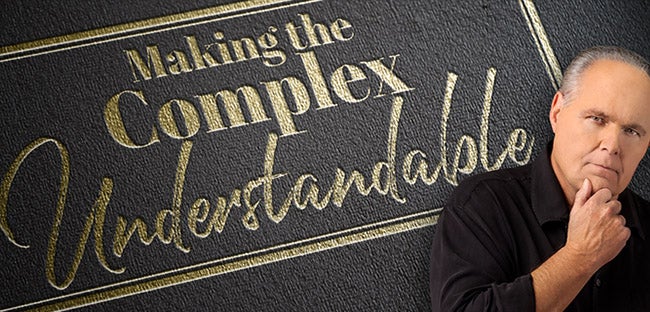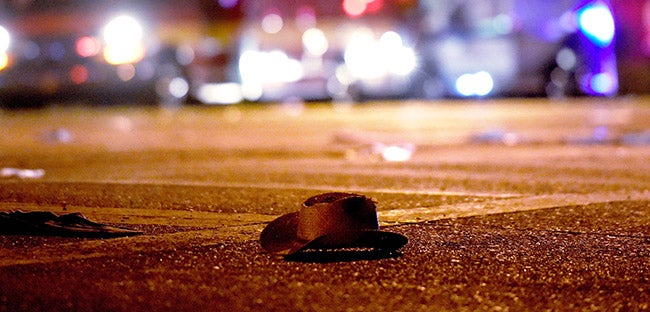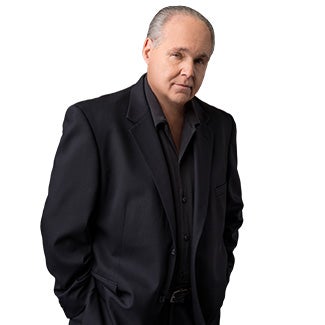RUSH: Now, ladies and gentlemen, I have received the thoughts of a professional who asks to remain anonymous, a professional in analyzing the personalities, mind-set and so forth of people like our shooter here in Las Vegas. And I just want to share with you his thoughts. He’s requested anonymity, and I’m happy to offer it and provide it. You might have heard of him. He’s a writer. But he has researched this for his work.
 And basically he thinks that an element of this, not the explanation total or complete, but an element of this is that too many people in our society do not take responsibility for how their lives turn out. It’s not just they don’t accept personal responsibility. It is they don’t think they have anything to do with how their lives have turned out, and they become embittered.
And basically he thinks that an element of this, not the explanation total or complete, but an element of this is that too many people in our society do not take responsibility for how their lives turn out. It’s not just they don’t accept personal responsibility. It is they don’t think they have anything to do with how their lives have turned out, and they become embittered.
He says, “I have studied these cases. Clearly this was premeditated slaughter. If the pattern holds — and we don’t know yet that it will — but if the pattern holds, we will likely find out this guy’s life was coming apart, that he scapegoated society or others for his problems and failures and his hopelessness, and that he decided to get even and go out in a blaze of glory. It’s the same nihilistic evil again and again, blaming others for your problems and seeking to sow destruction in revenge against the unfairness and injustice of it all.”
This sounds like it would apply to the guy that shot the Republicans practicing for baseball, Steve Scalise and others. He was embittered and enraged. He says, “I don’t know if we’ll ever be able to stop people from seeing themselves as victims of society, who then get angrier and angrier and want to strike back. But a healthy society does not encourage an outlook of grievance and helpless victimization, but ours does. People who take personal responsibility for their lives do not these kinds of things.”
These are the thoughts from my expert and I think there’s a lot of truth there. We know that we live in a grievance society where grievance has become its own form of politics. It’s spreading. Grievance is taught on many college campuses. Grievance is always treated as justified. Well, I take that back. If you are a white male or white Christian, your grievance probably will not carry the weight of others. But for the most part, those who have grievance and incorporate politics into their grievance generally are always said to be justified.
In fact, I might say that one of our political parties has actually, as a matter of strategy, tried to create as many victims of whatever as they can, and this party has then presented itself as the solution, the answer. And of course the problem with victimology, the problem with victimhood is once you adopt it, once you accept that you’re a victim, a lot of things happen.
You are immediately, in your mind, you are free of blame. You are free of responsibility. And you also are free in believing you don’t have a chance at succeeding or achievement or accomplishment because the deck’s stacked against you. ‘Cause you’re a victim. It’s-a-made-to-order political profile for a political party which seeks to gain power on the backs of such people. “It’s not your fault. We’ll fix those who did this to you. We’ll get even with those who did this to you.”
So you adopt that you’re a victim of something. You are a generational victim of slavery. You’re a generational victim of masculinity. You are a victim of male patriarchy. You are a victim of extreme right-wing politics. Whatever. Once you adopt it, once you accept it, once you yourself admit and acknowledge that you’re a victim, you are immediately saying you have no responsibility for yourself, and you have no ability to triumph, because no matter how hard you try and how hard you work, the deck is always going to be stacked against you.
 It’s a very artful and, for the Democrat Party, it’s a very successful political strategy to create as many victims as you can and then group them and then acknowledge their grievance and then promise to get even. Here’s what happens, though. They somehow never get the satisfaction of whoever it is that did whatever was done to them, there never is any revenge. The party claims they’re gonna get even, but it never happens. The people you end up blaming continue to live and continue to live prosperously or happily or whatever ways in which you don’t live, and so your anger festers and your resentment festers.
It’s a very artful and, for the Democrat Party, it’s a very successful political strategy to create as many victims as you can and then group them and then acknowledge their grievance and then promise to get even. Here’s what happens, though. They somehow never get the satisfaction of whoever it is that did whatever was done to them, there never is any revenge. The party claims they’re gonna get even, but it never happens. The people you end up blaming continue to live and continue to live prosperously or happily or whatever ways in which you don’t live, and so your anger festers and your resentment festers.
And all of that is used as a political advantage by the party which encouraged you to accept the fact that you’re helpless and not responsible because powerful forces have been arrayed against you. It’s a recipe for unhappiness. It’s a recipe for what is said here. Scapegoat society for others, for your failures, your hopelessness, and it builds and builds and builds and builds and builds to the point you gotta get even, and you take mental instability and throw it in the mix. “Well, then, Rush, why doesn’t everybody grab a gun and start –” The point here, not everybody is unstable.
BREAK TRANSCRIPT
RUSH: Well, well, well, well, well. The Daily Caller with an interesting dispatch here. The shooter’s name is Stephen Paddock, P-a-d-d-o-c-k. His brother is Eric Paddock, lives in Florida, says this is horrible for them, had no idea, please don’t blame my mom. But the shooter’s brother said that their father was Patrick Benjamin Paddock, a bank robber who was on the FBI most wanted list.
I’ve got a copy here of the actual most wanted list profile of Patrick Benjamin Paddock, and it says at the bottom of it that he was psychopathic. The brother says that Stephen Paddock wasn’t religious, wasn’t political, he wasn’t anything. We don’t understand this.
BREAK TRANSCRIPT
RUSH: Here is Christine in Nashville, Tennessee. Welcome. Glad you called. You’re next.
CALLER: Thank you. I know you touched on this earlier about the left winger who went and shot up the Republican baseball players. Being from the Tennessee area, knowing a lot of country music fans, overwhelmingly country music fans that I know — can’t speak for everybody — are either conservative or Blue Dog Democrats who would have voted for Trump. Just putting that out there.
RUSH: What do you mean — wait a minute, now. Wait, let’s define terms. ‘Cause some people use Blue Dog Democrats affectionately and some use it as a derision. How do you mean Blue Dog Democrat?
CALLER: I think they’re more conservative, more fiscally responsible.
RUSH: Okay, so we call ’em Reagan Democrats.
CALLER: Okay, Reagan Democrats.
RUSH: Right.
CALLER: So gun control has fallen off the media scope. This guy coming in here using this automatic weapon, he pulled that back in, and he’ll get to take out some conservatives and Reagan conservatives, Reagan Democrats. I know his brother said he wasn’t political at all, but obviously he didn’t know him very well. So that was a thought I had. I don’t know if I’m just way too paranoid.
 RUSH: Wait a minute, now. Wait a minute. I want to understand what you’re actually saying. Are you saying — correct me if I’m wrong here — are you saying that the audience, the crowd was at a country music concert, and therefore most of the people were probably conservative or lean to the right or, as you call them, Reagan Democrats. And so you’re looking at this as a bunch of those kind of people get shot at a country concert, and so you’re thinking, “Well, the shooter might have a bias or an animus against such people?” Is that what you’re saying?
RUSH: Wait a minute, now. Wait a minute. I want to understand what you’re actually saying. Are you saying — correct me if I’m wrong here — are you saying that the audience, the crowd was at a country music concert, and therefore most of the people were probably conservative or lean to the right or, as you call them, Reagan Democrats. And so you’re looking at this as a bunch of those kind of people get shot at a country concert, and so you’re thinking, “Well, the shooter might have a bias or an animus against such people?” Is that what you’re saying?
CALLER: Yes. That’s exactly what I’m saying.
RUSH: That these people were targeted because of their perceived political preferences? Is that what you’re saying?
CALLER: Possibly. Possibly. That was a thought I had, because that’s how the media has pushed everybody. Nobody can be just American anymore. You can’t be American anymore. You either have to be conservative or liberal. And if you’re conservative, you’re wrong. That’s how I see it.
RUSH: If you’re conservative from the South, like country music, you’re all kinds of potential wrong.
CALLER: Yes.
RUSH: You sound like a hick. You came from states that had slavery. That’s your point, right?
CALLER: Yes, that’s my point. And it may be off the wall, but that was one of my first thoughts was, “uh-oh.”
RUSH: Well, they’re saying they haven’t got a motive yet, so your theory is as good as anybody else’s, until we know for sure. I just to want make sure I understand. You’re thinking that this guy actually might have targeted people because of what he thought their political beliefs would be, which would then say that he obviously has some political —
CALLER: Right.
RUSH: — leanings even though his brother says that he wasn’t religious or political at all and this is a total shock —
CALLER: Well, he doesn’t know his brother, obviously doesn’t know his brother. If he knew his brother, he’d have seen all the red flags going up.
RUSH: You think so?
CALLER: I hope that if I was in the situation where someone I was close to was going off the rails, that I would notice.
RUSH: Well, the brother lives in Florida.
CALLER: Didn’t he live in Florida, too?
RUSH: For a time, yeah.
CALLER: Yeah, we need more backstory on this —
 RUSH: You’re also saying that you don’t think a guy who seemed perfectly harmless and normal one day picks up an automatic gun, slaughters 50-plus people, that you would know if somebody is —
RUSH: You’re also saying that you don’t think a guy who seemed perfectly harmless and normal one day picks up an automatic gun, slaughters 50-plus people, that you would know if somebody is —
CALLER: Well, he’s obviously nuts. But there could be more motivation to it than that.
RUSH: Yeah.
CALLER: That’s my thought.
RUSH: Yeah. It’s fascinating that you’re linking the kind of concert, you know, country concert with the audience you would assume gathered —
CALLER: Yes. And he waited for the — wasn’t Jason Aldean the final performer, the big headliner?
RUSH: Yeah.
CALLER: Waited for him to come on so that the crowd would be at its largest.
RUSH: Right.
CALLER: Yeah. There was a lot of thought put into this.
RUSH: So it’s meaningful that the guy didn’t try to take out people attending a rock ‘n’ roll concert, you think the —
CALLER: Yes, to me, yes.
RUSH: All right. We’ll put that in the hopper. Christine, I’m glad you called.
CALLER: Okay. Thank you.
RUSH: No, no. Seriously. Thanks very much.
BREAK TRANSCRIPT
RUSH: This is Donna in Winter Haven, Florida. I’m glad you waited. You’re next here on the EIB Network. Hi.
CALLER: Hi, Rush. Thank you. I’ve listened to you speak my mind for years, and I thank you from all of us who agree with me. The main reason I was calling was to say if the shooter lived, he would have received his rights. The dead and injured would have no rights. I think it’s best that we kill the shooters because it should start making them think twice. They’re not gonna get any publicity, and they lose their life. I’m sure that this shooter probably had some kind of a disease or something and he was a victim, he wanted to get even with the world for the fact that he got, what, cancer, something like that.
 RUSH: Wait, wait, wait, wait. Hold it a minute. Do we know that he had cancer or are you just speculating?
RUSH: Wait, wait, wait, wait. Hold it a minute. Do we know that he had cancer or are you just speculating?
CALLER: No. I’m thinking they ought to do an autopsy and find out if maybe Soros or the liberals paid him off and he took the money because maybe he was dying. Figured he’d go take somebody with him.
RUSH: I’m fascinated here how people think. One thing here. You think that the shooters knowing they’re gonna die would maybe provide a little bit of incentive for them not to do it, that they’re not gonna get any fame. They’re gonna get fame. Fame is a poison to people who don’t have it and want it. Do not doubt me on this. It is such a poison that some people will die to get it, and they will tell themselves over and over before they die, before they do what’s gonna get them killed, “I’m gonna be famous. People are finally gonna know me!”
Killing them, I think many of them are prepared for that, are willing to die if their grievance is such that they want it known and they want it known that they’re getting even and if they’re gonna become famous. A lot of profilers, professional profilers will say, “No, no, no, we want to take these people alive because we want to get to the motivation. We want to understand why they did it.”
Now, a lot of people, the hell with understanding why they did it. It doesn’t matter. They did it! There’s no justification. If you want to know why for scholarly research, fine. But if you want to know why for remedial purposes in others, don’t waste your time. Because some people just can’t accept that there is natural evil. A lot of people think everybody is innocent and clean and pure as the wind-driven snow until something poisons them or ruins them. And that’s not true. There is pure evil, born that way and there’s nothing you can do about.


